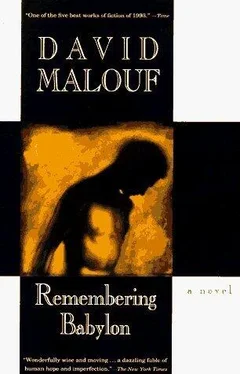She saw then, from the look on Mrs Hutchence’s face, that though her own faith had been absolute, Mrs Hutchence’s had not.
So it had been that that had saved her, the power of her own belief, which could change mere circumstance and make miracles.
She went, half-dreaming, and looked at the hive, all sealed now, a squared-off cloud, still drumming, that had once been clamped to her skin, a living darkness, so that the only light came from inside her, from the open space she had become inside the skin they made of living particles, little flames.
She had remained cool inside, and when the flames drew off what was restored to her had a new shape, was simpler; she had emerged with a new body, which the world — and this was the point — had dealt with to its limit and let go, and which, from now on, however things might appear, it could not destroy.
She was rather surprised really that she did not appear changed to Mrs Hutchence, since the body she was now standing in, as her mind saw it, was not at all the old one.
She looked past Mrs Hutchence to where she had stood just a moment back, and what she saw was not herself, not a gawky child in pigtails and a faded frock, but a charred stump, all crusted black and bubbling; and she saw it — this, when she met his astonished look, was what convinced her — through Gemmy’s eyes.
GEMMY, SUFFERING FROM bruised ribs and a broken mouth, but even more from a bruising of the spirit that threw him into moments of frantic terror, was given a room at Mrs Hutchence’s, a little back room so small you might have stood in it and touched your fingertips to either wall, but clean, freshly painted and cheerful, the women thought. It did not occur to them that its very spareness, its being so light and open, yet enclosed, might prove frightful to him. Once the door was shut he did not know where to set himself between its close walls.
There was a cot where in his first days in the house Leona sat beside him and fed him soup and tried to make sense of the stumbling stories he had to tell; also a chair with an embroidered cushion, and a low little chest of drawers. From the beginning the chest was a worry to him.
He believed at first that the discomfort it caused him, the sense that assailed him of his spirit being touched and interfered with, must come from something Mrs Hutchence kept there. Leona was astonished one day to find him sitting in the midst of a snowstorm. He had taken the sheets and pillowcases they kept in the drawers, hauled them out, dragged them round the room, and then tried, very ineffectually, to stuff them back again. What could have possessed him? Was it a tantrum? Something they had done? Mrs Hutchence reproved him, but lightly — she did not want the poor fellow upset — and they spent a whole morning with their sleeves rolled up and the copper boiling. To make sure there was no repetition of the trouble, Mrs Hutchence found a place for the things in her own room. The little two-drawered chest stayed empty. But Gemmy by then had discovered what it was that had touched him.
It was the smell of the wood, which was quite unlike that of any of the local timbers he had to do with, and the moment he understood it, he stepped out of the room, out of his present self, into a clearing that had always been there, he thought, just waiting for him to stumble to the centre of it. And there he stood again with fine wood-dust raining down on his head, mixing with snot to clog nostrils and throat.
Back, far back, before Willett, when he was still at the maggot stage, he had been one of an army of little shitty creatures, mere bundles of rag and breath but with hands that could clasp a broom and strength enough to push it, whose job it was, for all the hours of daylight, to crawl about in the low place under the machines in a timber mill, sweeping sawdust into wooden pans. Fine wood-dust poured incessantly from the teeth of the saws — that was the smell — and there was another, heavier smell, which was that of the oily grime round the base of the machines and the bolt-heads that fixed them to the floor, which they picked out with their nails, mixed with sawdust, and ate. He had never since tasted anything so good. Overwhelmed, he stared at the object, the little pinewood chest that came no higher than his thigh, the same height he had been then, which had brought all this back to him.
When darkness fell in the close little room, it stirred; the smell moved towards him and the screaming of the machines returned that all day had deafened them so that even when they were stilled the screaming in their heads went on. He would feel about in the darkness then for the others. What part of the world had they got themselves to? Their sharp little elbows and knees had poked through his flesh. When they curled up in close heaps together between the legs of the machines, among snufflings and breathings and bubbly murmurings, their communal heat and breath was a thing his body had never forgotten or known again. Where were they, his fellow maggots? What had they turned into when, at five or six, he had discovered the shape of an ancient, undernourished child and become Willett’s Boy? All night his body sought them in his sleep.
So the room began to work its magic on him. Sweating between walls he entered a different sleep from the one he had known in the lean-to at the McIvors’ and in his years with the blacks, a sleep that belonged to a different life and produced different demons; the kind that live in rooms.
It is a fearful thing to be faced in the dark by a pair of cracked leather boots, all their eyeholes torn, their laces trailing, the loose tongues charred and smelling of flame.
The boots are Willett’s. They are empty. Touched with flame, they sit propped up in front of a grate. Willett has just stepped out of them, and in his stockinged feet, one big toe showing, is padding round the room, filling it with his richness and the rumblings of his voice. Willett. Source of unquestionable commands; of curses, blows, growls, slobbery kisses. The first being he has memory of. Before Willett there is only darkness, his life as a maggot, the giant legs of machines. In a moment he will turn his attention from Willett’s boots, which it is his job to place in such a way that they dry but do not scorch, and there, in the reflected light of the fire, Willett himself will stand, red-haired, gigantic, with his shaggy brows and a voice that can creep about in every corner of a room, the fiery god-demon and ruler of his world, whose touch and smell and breath is on every object he puts his hand to.
The boots? Willett’s. The long clay pipe that he is allowed, when Willett is in the mood, to take a slow drag on? Willett’s.
The blackened pan is for cooking Willett’s supper, a nice fat sausage, and provides his own supper too, in the grease he scrapes from it with his finger or with a crust of bread.
Willett’s razor strop. Which he has experience of on Saturday nights, when he uses it to whet Willett’s razor — more intimately, if he has been playing up, when Willett gives him a lick of it across his back. Then there is the cake of soap that gives Willett’s hands their smell, a choking sweetness.
He is Willett’s Boy, as the boots are Willett’s boots. He has nothing of his own. Everything that comes to him comes through Willett, including his name, Gemmy, which is what Willett calls him when he is not just ‘Boy’.
Willett is a rat-catcher, and they have a bulldog, Ketch, and two ferrets. If the ferrets have names he has forgotten them.
Having known no better life than this, he cannot imagine one. Willett provides the only bit of closeness he has ever been offered, and since he has nothing else to love, he loves him with a fierce intensity, a fear too, which is the greatest he knows, that he may get lost, or that Willett one day may abandon him, taking with him the whole world as he conceives it: Ketch, the ferrets, the streets Willett is king of, the razor, the sweet garden smell of his hands, his curses, his kisses, the warm grease of the skillet, the boots with their trailing laces and tongues lit with flame, his name, Gemmy, his claim to existence as a boy, as Willett’s Boy.
Читать дальше












